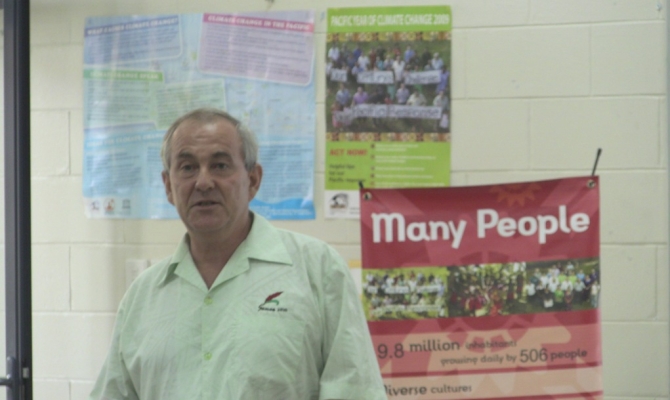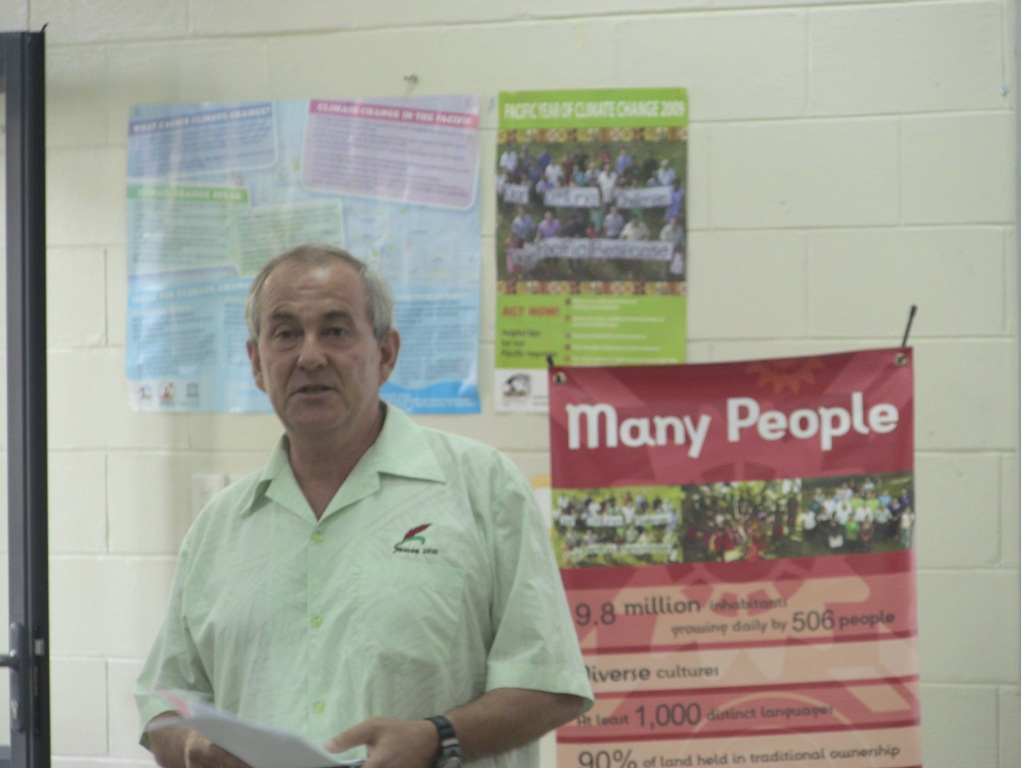
Opening statement to the Pacific Emerging Environment Leaders Symposium from David Sheppard, Director-General of the Secretariat of the Pacific Regional Environment Programme
Delegates, SPREP staff, Ladies and Gentlemen
Welcome to the Pacific Emerging Environment Leaders Symposium.
You have had a challenging path to get here. As we know travel is always difficult in our region and I understand we have lost one of our participants en route to  Samoa.
Samoa.
But, more importantly, and even more challenging, has been your selection to participate in this Symposium.
Your path to get here has involved a very competitive process, with more than 100 applicants applying to come to this symposium.
You represent the "cream of the cream" of young environmental leaders in the Pacific. Congratulations!
I'm pleased we have participation from many countries of the Pacific and also to see you come from a range of backgrounds – including environment, legal, media, agriculture, energy, NGO, small business and government.
Welcome to SPREP and the SPREP compound – your home for the next few days.
SPREP is the regions environment agency. Our vision is:
"The Pacific environment, sustaining our livelihoods and natural heritage in harmony with our culture"
Linked to this vision are the principles that, in our region, you can't separate the environment from sustainable development, and also that you can't separate nature from culture.
We implement programmes throughout the region in 4 areas: biodiversity and ecosystem management, climate change, waste management and pollution, and environmental monitoring and governance.
You will hear more about our activities over the next few days, including through the innovative environment showcase.
Why should SPREP be interested in organising this PEEL Symposium?
First, the term "youth are our future" is perhaps an overworked cliché. But it is certainly true in our region.
The term "youth bulge" does not refer to our waistline, although perhaps this does apply to me.
This term refers to the proportion of youth in the population.
The Pacific has a large "youth bulge" in the adult working age population. In our region the youth age group of 15-29 years accounts for a third of the working age population.
You are the largest sector of the population and arguably the most important, particularly as you move into leadership positions in our Pacific countries over the next few years.
You are the ones who will be influencing and setting policy which will determine how well our environment is managed in the future.
We want your decisions to be based on an understanding of environmental issues and their implications. We are sure this Symposium will assist this objective.
Second, environmental management represents one of the major, if not the biggest, challenge for the Pacific region.
Ban Ki Moon, the Secretary General of the United Nations recently visited Kiribati and this bought home to him the impacts of climate change. After his visit he said that he used to understand climate change from the brain and that now he understands it from the heart.
Climate Change is an environmental issue that cuts across all sectors. Pacific leaders have emphasized, including at the Pacific Island Forum Meeting last month in Auckland, that climate change is the biggest challenge facing Pacific Island Countries.
Our leaders have reminded us that climate change has implications across all sectors and is in fact an issue of national security.
Less obvious, but also very significant, is the loss of biodiversity in our island countries. We know the loss of plant and animal species in the Pacific is amongst the highest in the world for some species, and that threats such as invasive species have immense environmental and economic impacts.
Problems of waste and pollution are also becoming increasingly apparent and important.
SPREP is playing a leadership role in these areas in the Pacific region.
It is essential to reach out and involve you as young professionals on these issues, as you will have to live with the decisions that are being made now.
As mentioned, I am delighted that you are coming from a range of different work sectors. This is essential as environment is not a narrow sector – it is multi sectoral and cuts across all areas in which you work in your countries.
SPREP's view is that a healthy environment is essential for a healthy life in the Pacific and that the environmental environment must be mainstreamed into all sectors.
This is mirrored in the evolution of SPREP.
We have been around for a long time, in fact since 1972 when we started life as a programme within SPC. I first worked at SPREP in the 1980's and had first- hand experience of the organisation in its early stages.
In those days we were very narrowly focused on environment, mainly working on coral reefs and on protected areas, and working with environment departments.
If we fast forward to today, you will see that we still work closely with environment agencies but we have a much broader focus and range of activities. Our main contacts in your countries today are just as likely to be Departments of Planning and Finance, Energy or Public Works.
Our main contacts, in fact, are people like you.
We are happy that you will have the opportunity to learn about environmental issues, and about SPREP, and will take this home to apply in your home countries.
A third point is that we need your ideas and energy. A wise person once said that "no one has a mortgage on good ideas", this is particularly true of young professionals.
I was the Secretary General of the Vth World Parks Congress, held in Durban, South Africa in 2003. As part of the planning for this immense undertaking we established a number of groups, networks and committees. One of the best and most effective, in terms of providing practical, useful and innovative ideas, was the Network of Young Professionals.
We want to reach out and hear your ideas on how to address the many environmental challenges in the Pacific.
This Symposium builds on previous efforts.
In April 2007, the first Pacific Future Environment Leaders' Forum, organized by SPREP, was held here with around 25 participants from across the region.
This Forum required participants to initiate activities once they returned to their countries. Eleven participants maintained connections with SPREP and conducted follow up activities, including those who established the Econesians group at the University of the South Pacific.
In 2008, a second Leadership Forum was organized in Suva, Fiji, with around 40 participants, including four of the 2007 participants. The 2nd Forum focused efforts on developing project proposals for funding and we received some support from the British High Commission in Suva.
The second Forum developed a vision statement which was taken to the IUCN World Conservation Congress in Barcelona. A google-based e-forum was also established – it was active for a few months before several individuals either graduated and moved to their first jobs, or changed jobs.
This brief history is perhaps typical of many initiatives aimed at building capacity in the environment area.
We could also say the same about the efforts of the Wallabies against the All Blacks over the weekend.
So, it is important to start strongly but efforts must be sustained in the long term.
Lessons we have learned from the earlier initiatives include the need to select participants that are motivated and are in positions where they can influence change in their countries.
We have also learnt that this Symposium must concentrate on practical longer term actions which are achievable – not just statements and plans.
This Pacific Emerging Environment Leaders' Initiative thus has a longer-term focus and has deliberately has targeted young leading professionals from different disciplines and sectors.
What are our Expectations?
By the end of this Symposium we hope you will have heard good examples of leadership in the environmental area in the Pacific, that you will have shared your ideas and have looked at concepts in different and challenging ways.
We hope you will have discussed and agreed a longer-term Initiative (the PEEL) and the form this initiative should take.
We suggest you develop a strategy for ensuring that this initiative is implemented. I would like to see suggestions which involve both you as a group and as individuals.
I suggest you identify achievable and practical tasks and also consider how you can network within this region.
Where useful and relevant I suggest you also link with other relevant young professional networks around the world. They are grappling with the same types of issues you are so get in touch and learn from their experiences.
I would particularly welcome your recommendations on how SPREP can take integrate the Emerging Environment Leaders Initiative within our Work Plan and Budget. Engagement of young professionals is very important and I would like to like to see SPREP "putting its money where its mouth is" on this issue.
Finally, I hope you will have built real and lasting friendships and networks across countries and across sectors. I'm sure you will.
I urge you all to get actively involved – you all have a story to tell – please share your experience.
Thank you for coming and I would also like to thanks Seema for her tireless efforts in driving this exciting initiative.
I wish you all the best for a successful Symposium and look forward to hearing the results.
Thank you, Fa'afetai lava.